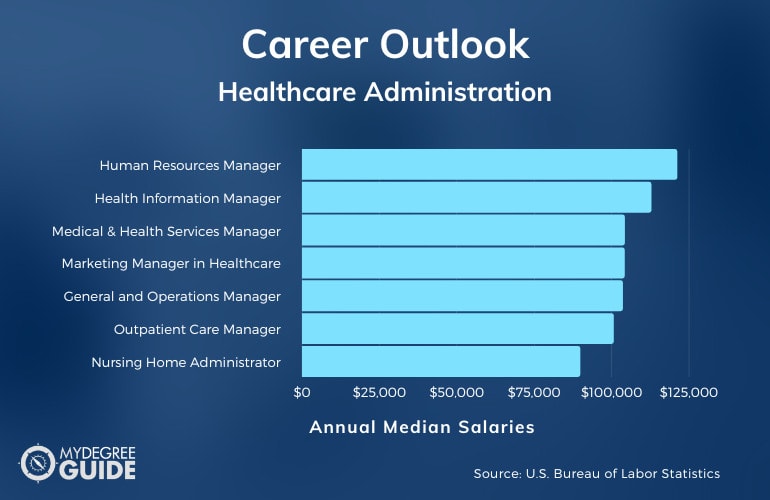If you’re interested in a graduate-level degree for healthcare administration or healthcare management, you’ve probably run across the MHA vs. MBA debate.

Editorial Listing ShortCode:
Which credentials are better for today’s students? The answer is a bit more complicated than you might think.
Comparing the MHA vs. MBA – Key Differences

In simple terms, a Master of Healthcare Administration (MHA) is a specialized degree while a Master of Business Administration (MBA) is a diverse, wide-ranging degree that can be focused on different fields of study, including healthcare.
There’s a lot of overlap between these degrees in terms of subjects and skills, but there are some notable differences, too.
Master of Health Administration

Are you certain about your interest in healthcare? Do you want a degree that’s completely devoted to the legal, technical, ethical and clerical challenges of the industry?
A Master of Healthcare Administration (MHA) might be the right choice for you. It covers the fundamentals of business, but unlike a broad-spectrum MBA, it filters everything through a healthcare lens.
Editorial Listing ShortCode:
You might also find this degree offered as a Master of Healthcare Management (MHM). It’s the same thing. Some schools just label it differently.
MHA Curriculum

What classes can you expect to take as a healthcare administration student? While every university will have its own credit and course requirements, here are some of the most common subjects that are taught to MHA students.
- Health Informatics/Electronic Healthcare Systems
- Health Administration and Business Law
- Fundamentals of Management for Healthcare Organizations
- Health Policy Development
- Introduction to the U.S. Health System
- Health Economics
- Medical Coding and Classification
Many MHA programs have a fieldwork requirement as well. It might take the form of a residency, internship or practicum. If you’re considering a healthcare administration degree online, this is something to ask an advisor about.
Master of Business Administration in Healthcare Management

A Master of Business Administration (MBA) is a business degree. It’s a common stepping stone for managers, executive officers and other leaders in the corporate world. It doesn’t have to focus on healthcare.
If that’s your area of interest, however, there are many MBA programs that offer concentrations in healthcare administration or healthcare management. There are even specialized programs for things like public health, health informatics and pharmaceutical management.
Editorial Listing ShortCode:
That said, you don’t have to specialize. A general MBA degree can teach you real-world business skills to apply to many different industries. If you aren’t totally sure that you want to go into healthcare administration, an MBA can keep your options open.
MBA Curriculum

- Group Dynamics and Team Leadership
- Financial Management
- Information Technology (IT)
- Dynamic Marketing Strategies
- Microeconomics/Macroeconomics
- Global Economic Development
- Business Analytics
If you choose to specialize, your healthcare-related courses might look like those from an MHA program. They could include medical coding, hospital finance, health informatics and more.
Healthcare Administration Careers & Salaries

Regardless of your degree type, there are many career opportunities in healthcare administration. You can find work in schools, hospitals, clinics, rehabs and private practices. You can stay behind a desk; you can travel. It all depends on your particular job.
As for the money, you can pull some impressive paydays with a healthcare degree. According to the Bureau of Labor Statistics, the average salary for a master’s degree holder in the medical and health services management field is about $90,000, earning a premium of about $20,000 over those with a bachelor’s degree. These numbers in general make an MBA or an MHA degree worth it for many students.
Editorial Listing ShortCode:
This is just an average, however, so don’t take it as an upper limit. Some high-level jobs can earn you six figures per year, especially if you’re a CEO or CFO. What other career options are available to you with a degree in health management? Here are some careers The Bureau of Labor Statistics lists in the health administration field:
| Careers | Annual Median Salary |
| Human Resources Manager | $121,220 |
| Health Information Manager in Hospitals | $112,870 |
| Medical and Health Services Manager | $104,280 |
| Marketing Manager in Healthcare | $104,240 |
| General and Operations Manager | $103,650 |
| Outpatient Care Manager | $100,690 |
| Nursing Home Administrator | $89,880 |
| Administrative Services Manager in Healthcare | $87,920 |
| Compliance Officer | $71,100 |
| Social and Community Service Manager | $69,600 |
Something else to remember is that salaries can fluctuate depending on many outside factors like age, experience, location and job demand. Two people with the same job can make different amounts of money depending on where they live and what their resume looks like.
In addition, these jobs may be comparable for those looking at MPH vs MHA as well.
Best Careers for MHA Graduates in the Healthcare Field

While everyone has their own definition of “best,” it’s true that some healthcare administration careers have better salaries than others. Here are just a few of the top-paying careers for an MHA holder.
| Careers | Annual Median Salary |
| Health Information Manager in Hospitals | $112,870 |
| Medical and Health Services Manager | $104,280 |
| General and Operations Manager | $103,650 |
| Outpatient Care Manager | $100,690 |
Some of these positions don’t necessarily require a master’s degree, but according to the U.S. Bureau of Labor Statistics, employment outlooks are highest for those with graduate-level qualifications.
Best Careers for MBA Graduates in the Healthcare Field

If you’re interested in obtaining an MBA as opposed to an MHA, you’ll have many of the same career options, but their scope will be expanded. Their salaries can be higher as well.
According to the Bureau of Labor Statistics, some of the top-paying careers for an MBA degree holder include:
| Careers | Annual Median Salary |
| Chief Executive Officer (CEO) | $185,950 |
| Healthcare Director | $160,950 |
| Advertising and Promotions Managers | $133,460 |
| Chief Financial Officer in Healthcare | $118,950 |
Remember that an MBA can be applied to many different industries, including ones that are outside of healthcare. This can impact the salary averages that you see on various websites. If you want accurate, up-to-date numbers for MBA graduates in the healthcare industry, look at what professionals are currently making in your region.
Choosing Between a MHA or MBA

Should you get an MHA or MBA? They’re both graduate degrees. They teach many of the same skills and subjects. Employers tend to look at them with equal weight.
Since they’re so similar, it might be helpful to look at their differences instead.
Master of Healthcare Administration (MHA)
- Specialized degree
- Preparation for specific jobs
Master of Business Administration (MBA)
- General degree
- Flexibility for various jobs/industries
Going to grad school is a big decision, so you’ll want to make sure that you’re on the right track with your degree program. Ultimately, no one can make this choice for you. You’re the only one who knows whether you’d be best suited for an MHA or MBA.
What are Key Differences between the MHA and MBA?

There are many similarities between a Master of Healthcare Administration (MHA) and a Master of Business Administration (MBA), especially if you choose the latter and concentrate your studies in healthcare management. You’ll learn the same subjects, and in many cases, you’ll be qualified for the same jobs as well.
The biggest difference between an MHA and an MBA is its range. With an MHA, every course that you take will have a healthcare focus. With an MBA, you’ll take a more diverse range of courses, including some that don’t have anything to do with healthcare.
Editorial Listing ShortCode:
For example, let’s say that you want to learn about finance. With an MHA, you might be offered classes in hospital budgeting and insurance billing. With an MBA, you might be expected to learn about economics, audits, investments and financial markets.
There are both pros and cons to each type of degree, so you’ll need to do some soul-searching to figure out which is best for you.
What is a Master of Healthcare Administration?

A Master of Healthcare Administration (MHA) is a high-level degree for the administrative side of the healthcare industry. It can prepare you for work as an officer manager, financial director, medical coder and more.
Depending on your job, you could work everywhere from a hospital to a rehab facility or nursing home. Your employer could be public or private. For example, you could work for a state-funded lab or a privately-held business or insurance company.
As an administrative worker, you’ll probably be behind a desk, but there are also jobs with a human element that will get you out and about. There are even jobs that involve travel.
What is a Master of Business Administration?

A Master of Business Administration (MBA) is a business degree. It doesn’t have to teach healthcare subjects, but there are many programs that offer them as a degree concentration.
The foundation of an MBA is business acumen. You can learn the things that you need to succeed in a modern business environment, including law, finance, marketing and economics.
If you choose to specialize in healthcare management, you can also study things like health education and health informatics. Focus areas can be quite broad, so it’s a good idea to look at courses and credits before you enroll.
Does the school teach the specific skills that you want? Does it offer any residencies or internships in the field? What are their online programs like?
Something to note about MBAs is that their programs can have many different names. Your degree might be called either “healthcare administration” or “healthcare management.” Your concentration might have a “health” or “health sector” emphasis. These programs are all teaching the same things, so don’t fret over the labels.
Getting Your MHA or MBA Online

There are many different paths that can lead you into the world of healthcare administration. If you’re debating an MBA in healthcare management vs. masters in healthcare administration, you’ll want to consider them all.
What subjects do you want to learn? What careers are you considering? What degree programs are offered by your university?
Think about these things before enrolling. Whether you’re interested in a specialized MHA or a more general MBA, you’ll want to be fully confident in your academic decisions as a future student of healthcare administration. It’s an exciting field with a lot of opportunity, but your resume will need to reflect your passion.

